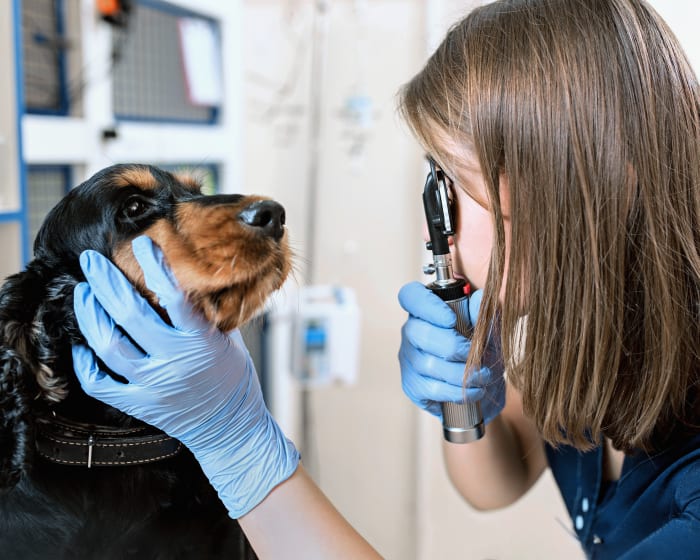
Eye Care for Pets in Vancouver
In partnership with your pet’s primary care veterinarian, our board-certified ophthalmologist will provide the most comprehensive and compassionate eye care possible for your pet.
Eye conditions that affect cats and dogs can range from minor to severe. These conditions may lead to discomfort and even reduced vision. When these conditions are diagnosed early, treatment can reduce pain and preserve your pet's eyesight.
At Columbia River Veterinary Specialists, our ophthalmologist can diagnose and treat virtually any eye disease or condition, including cataracts, infections, tumors, glaucoma, dry eye, uveitis, corneal ulcers and more.
Our Board-Certified Veterinary Ophthalmologist
A board-certified veterinary ophthalmologist is a veterinary specialist who has completed extensive training after veterinary school focused on eye disorders in animals. Dr. Rosalie Alls joined our team at Columbia River Veterinary Specialists in 2022. She is passionate about providing compassionate care to pets with eye conditions or diseases.
What to Expect at Your Appointment
We want your pet's appointment with our veterinary ophthalmologist to be an agreeable experience from start to finish. When you first arrive, you will be greeted by one of our receptionists who will ask you to complete our new patient forms.
Please bring any medications your pet is taking to the first appointment. Recent blood tests or pertinent records should be faxed to us in advance of your visit.
-
Patient History & Diagnostics
Once we have received all your information, we will bring you and your pet into an examination room and obtain a thorough history.
Initial diagnostic tests including a Schirmer tear test, applanation tonometry, and vital staining will be completed.
-
Comprehensive Exam & Additional Diagnostics
The ophthalmologist will begin by performing a complete exam. The exam will include vision testing, slit lamp examination (biomicroscopy), and indirect ophthalmoscopy.
The ophthalmologist will then discuss your pet's ocular condition with you, and make therapeutic and/or further diagnostic recommendations.
Other diagnostic techniques that may be performed include gonioscopy, nasolacrimal flushing, harvesting of corneal and conjunctival cells, cytology, aqueocentesis, ocular ultrasound, electroretinography, genetic testing for inherited eye disease, and blood pressure measurement.
-
Discharge & Next Steps
When your visit is completed, you will be provided with discharge instructions containing a diagnosis, directions for medical therapy, and a description of the current ocular condition.
The ophthalmologist will also send your primary care veterinarian a referral letter to inform them of their findings. We strive to work with your veterinarian to provide the best comprehensive care possible.
Symptoms of Eye Conditions
There are several common signs a cat or dog may exhibit if they have an eye condition. If any of the following symptoms are identified in your pet, your veterinarian can contact us for an appointment with our ophthalmologist.
- Discharge
- Squinting
- Tearing / Tear-Stained Fur
- Swelling
- Vision Loss (sudden)
- Cloudiness
- Eye Rubbing
- Change in Eye Color
- Red Eye
- Vision Loss (gradual)
